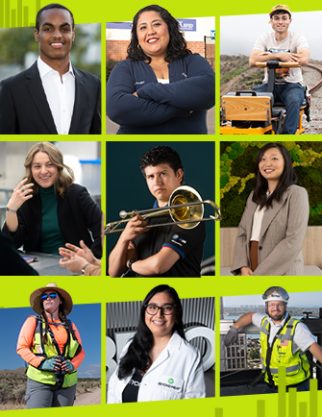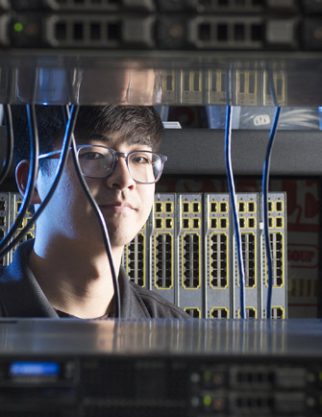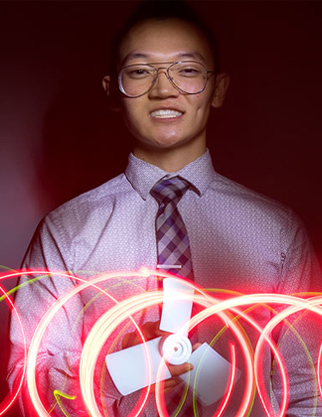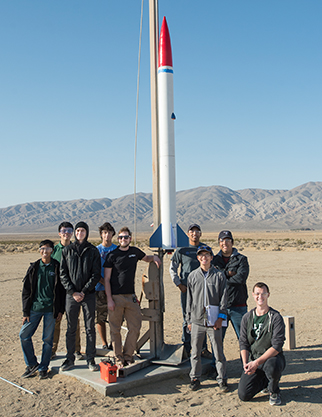Some work in private industry. Others found careers in education.
There is a diversity sourcer at SpaceX, a director of equity programs at Whittier College, a human resources coordinator at Tesla, the basic needs coordinator at Mt. SAC, a procurement team manager at Metropolitan Water District and a team manager for Puget Sound Education Service District.
What these six alumni have in common is a commitment to service and the dedication of their careers and lives to making advocacy and diversity and inclusion an important part of what they do.
Corey Mac Gaither (’11, sociology)
Diversity Sourcer, SpaceX
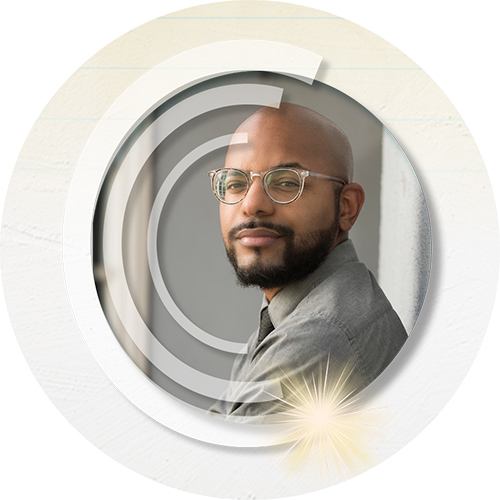
Corey Mac Gaither owes his career success, in some small part, to visits to his barbershop.
Back in 2008, Gaither was a self-described underachieving business major 10 to 12 units shy of graduating with a degree in technical operations management when some trips to his local barber shop convinced him that a change was necessary and possible.
Gaither enjoyed the rousing discussions he had in the shop around social and political issues, which reminded him of the similar back-and-forth he often had in his elective sociology classes.
“I thought, ‘These are the kinds of issues I talk about with my friends or at the barber shop.’ I loved the debate in sociology classes. When those issues come up, you get to hear all kinds of viewpoints.”
Gaither changed majors and a decade later, the Rialto native is bringing his passion for sociology to his work in the corporate world as a diversity sourcer for SpaceX, the aerospace company founded by Elon Musk. Gaither, who joined the company in January, looks for diverse talent and works to increase the diversity in the company’s pipeline. His job involves conducting research, going to conferences, talking to affinity groups and networking. As a sourcer, his role requires him to engage with young professionals to build and maintain the company’s talent pool, which is beyond what a typical recruiter would do.
“Companies are learning that they need to get sourcers because recruiters can only do so much,” he said.
Gaither, the Cal Poly Pomona Black Alumni Association president, might be relatively new to SpaceX, but he isn’t a stranger to work in diversity and inclusion. For two years, he was with the Southern California Minority Supplier Development Council, a national organization that helps companies diversify the suppliers they contract with. He felt an affinity for the job because supplier diversity came out of the Civil Rights Act of 1964, he said.
His next post with the African American Board Leadership Institute solidified his passion for diversity and inclusion, he said. The institute, founded by attorney Virgil Roberts and Yvette Chappell-Ingram, former president of the California Legislative Black Caucus, recruits African Americans to serve on corporate and nonprofit boards. Gaither was with the organization for 2 ½ years.
Gaither says he loves working in diversity and inclusion and plans to continue for the long haul.
“Studies show that companies that are more diverse are more profitable,” he says. “Diversity of thought and experience helps you to have no blind spots because you have various ideas coming to the table.”
Studies show that companies that are more diverse are more profitable,” he says. “Diversity of thought and experience helps you to have no blind spots because you have various ideas coming to the table.
Jenny Guerra (’09, animal science)
Director, Office of Equity and Inclusion, Whittier College
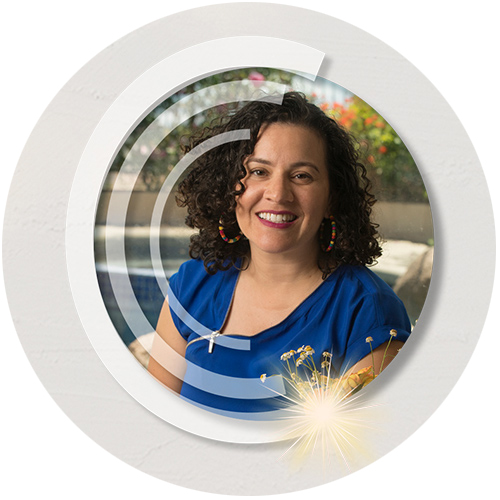
At Whittier College, Jenny Guerra is like the fictional television character, “The Equalizer.”
A student shares a problem with a peer. The buzz swells that Guerra is the problem solver, and here the student comes seeking a resolution. However, unlike the TV character, who swoops in to save the day in every episode, Guerra offers sound advice to empower students to be their own problem solvers.
“When students come in doubting themselves, I validate that they deserve to be here,” she says. “Or when they come in with an idea and think it’s impossible to create this on campus, I give them the tools they need and support them. I sit in the backseat and let them drive.”
Guerra knows what it’s like to be a young student trying to find her footing in the unfamiliar world of a college campus. The South Gate native came to Cal Poly Pomona an aspiring veterinarian. But after taking a job at the Cesar E. Chavez Center for Higher Education, where she planned cultural events such as Dia de los Muertos and eventually became the office manager, Guerra fell in love with student affairs and found her voice.
“When I started working there is when I really discovered activism and learning about my identity,” she says.
I did a lot of outreach to high schools and middle schools. Whatever was not told to me [when I was growing up], I wanted to be able to share with students who looked like me.
The center’s then coordinator, Cecilia Santiago-Gonzalez (currently assistant vice president for strategic initiatives for student success), suggested Guerra pursue a career in student affairs, a field she didn’t know existed. After graduating, she worked for two years in the Office of Student Life and Cultural Centers and later earned her master’s in higher education and administration from Florida International University. She came back to Cal Poly Pomona and worked for University Housing Services for two years before taking the position in the Office of Student Engagement at Whittier College.
In her current role, she organizes cultural graduations, conducts diversity and social justice trainings, and advocates for students, especially the historically marginalized.
“It’s definitely rewarding and takes me back to why I do the work I do,” Guerra says. “I always want the students to have a voice.”
Christine Lac (’18, marketing)
Senior Human Resources Coordinator, Tesla

It was a rallying cry, a call for unity in the face of a rising number of hate crimes.
Celebrities and those without household names alike posted #StopAsianHate on social media platforms, and journalists interviewed Asians and Asian Americans who feared being blamed or attacked for unsubstantiated claims about the COVID-19 pandemic.
For Christine Lac (’18, marketing), the movement hit home. When she was invited to participate in Cal Poly Pomona’s Professor for a Day, Lac says she took it as an opportunity to talk to students about the value of cultural diversity and the importance of showing empathy, checking their biases and learning to listen to others who may have different experiences.
“It had taken up space in my mind,” she says. “It is disheartening to see that type of hate, so I wanted to talk about that as well.”
The dialogue with students planted a seed that Lac intends to water through her role as the senior human resources coordinator for Tesla’s energy team. The Huntington Beach native works at Tesla’s training center in Rancho Cucamonga. When she previously worked on the talent management side at the company, she did some work in the area of advocacy and diversity – attending employee resource groups such as Women in Tesla to hear any concerns employees might raise.
Lac recalled when she was first getting started in her career and hearing stories about microaggressions women in tech fields faced. That made an impression and taught her the importance of using her voice and her role to try to make the workplace more inclusive.
Tesla has several initiatives to attract diverse candidates, something Lac appreciates. She plans to research best practices at other companies and broaden her scope in fostering diversity in her role.
“Managers tend to hire people who look like them and talk like them because it’s familiar,” she says. When you put in more diverse employees, it makes the team more productive. Inclusivity adds something.”
Rigo Estrada (’08, political science)
Basic Needs Resources Program Manager, Mt. SAC
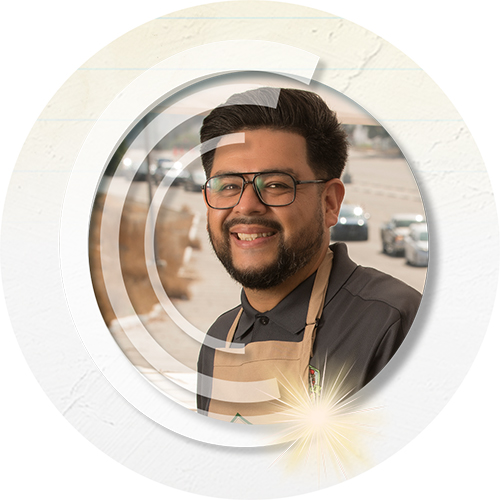 Rigo Estrada’s success proves that a person only needs a few solid supporters in their corner to make it.
Rigo Estrada’s success proves that a person only needs a few solid supporters in their corner to make it.
For the Pomona native, those people included a high school teacher who made sure he applied to college, college professors for guidance, mentors for encouragement and friends for growth.
These days, Estrada is all of those people rolled up into one as the coordinator of Mt. SAC’s Basic Needs Resources Program. He serves students by providing food resources and housing referrals, overseeing the campus food pantry, assisting with CalFresh applications and referrals, and offering life skills workshops, among other services.
“A lot of times schools are very one dimensional,” he says. “The type of programming that we have at Mt. SAC looks at supporting students not only with their educational goals, but to make sure they are pursuing what helps them grow as human beings.”
Estrada knows about personal growth. He went from knowing nothing but his Pomona hometown to getting active on campus in various cultural organizations to traveling to Ghana with Political Science Professor Renford Reese and a study abroad cohort.
“I grew a lot during my time at Cal Poly Pomona,” he says. “I learned a lot, but I never focused on a professional track.”
After college, he worked at the Boys & Girls Club for four years before pursuing a master’s in social work at USC. Once he completed his studies, he was a social worker at a foster family agency, certifying foster parents. After three years, though, he shared with mentor Cecilia Santiago-Gonzalez, currently assistant vice president of strategic initiatives for student success, that he was getting burned out as a social worker.
She encouraged him to look for other opportunities and passed on information about the job at Mt. SAC.
“I applied and luckily the program saw me as a good fit,” he says. “It was very unexpected. It was not planned.”
Now, Estrada gets to fight for students and cheer them on, much like his support system did for him.
“I’m definitely an advocate for our students and want to make sure they are able to succeed,” he says. “I gravitate towards servant leadership because of the support I received. I was your typical at-risk youth. I never had too many role models early in my life, but I also had that support.”
John Poli (’93, political science)
Procurement Team Manager, Metropolitan Water District of Southern California
President-elect, CSU Alumni Council
 John Poli believes in the power of a Cal Poly Pomona — and CSU — education.
John Poli believes in the power of a Cal Poly Pomona — and CSU — education.
That belief is something he shares as the past president and active board member of the Cal Poly Pomona Alumni Association.
He celebrates it as CPP’s representative on the CSU Alumni Council and impresses it upon lawmakers through CSU for California, a group that lobbies state lawmakers for more funding for infrastructure, student assistance and the CSU’s Graduation Initiative 2025.
The alumnus, who regards the opportunity to speak at President Soraya M. Coley’s Convocation in 2016 one of the highlights of his tenure as Alumni Association president, actively partners with Cal Poly Pomona’s legislative affairs group and supports students through the Alumni Association’s mentoring program.
As a CPP and CSU advocate, Poli practices what he preaches when he encounters and mentors fellow alumni — the importance of giving back.
“I enjoy the focus that has been placed on alumni by Dr. Coley throughout her tenure at Cal Poly Pomona,” he says. “The alumni have a seat at the table. The alumni have the resources to give back, to teach the next generation and help the undergraduates.”
Poli, who works as the procurement team manager for the Metropolitan Water District of Southern California, says advocacy is one of the most rewarding aspects of what he does for the university. He can be both an educator and a promoter, working with legislators who might not know much about the positive economic and social impact of the CSU.
“As an advocate, you’re promoting a common objective on behalf of students and alumni for not only Cal Poly Pomona, but the whole CSU,” says Poli, who earned a master’s in public administration from Cal State San Bernardino in 2006.
Poli will keep pushing to grow alumni engagement on campus and throughout the CSU.
“When you think about alumni, you realize they’ve come through the undergraduate or master’s programs, so they have an understanding of what the university offers and can share that experience with others,” he says. “The resources alumni bring back to the university is invaluable.”
Mercy Daramola (’10, political science)
Interim Director of Postsecondary, Puget Sound Educational Service District
 Mercy Daramola describes herself as a professional student while at Cal Poly Pomona.
Mercy Daramola describes herself as a professional student while at Cal Poly Pomona.
From working as a residential advisor in student housing and leading the Multicultural Council to serving as ASI Vice President during her junior year to immersing herself in clubs, she left few student activities untried.
“I enjoyed Cal Poly Pomona,” says Daramola, whose parents are immigrants from Nigeria and came to America to continue their educational journey. “Cal Poly Pomona enjoyed me too.”
During her senior year, she received the James Bell internship, which provided recipients exposure to all aspects of student affairs and enabled her to rotate positions in the Student Health Center, Division of Student Affairs and Bronco Athletics. After graduating, Daramola went on to earn her master’s degree in higher education and student affairs from New York University.
She had posts at three universities and an education nonprofit in Washington state and now works as interim director of postsecondary of the college and career team for Puget Sound Educational Service District. It is one of nine regional education agencies in the state that partner with schools, colleges, learning programs, organizations, policy makers and others to improve student success by providing needed resources, specialized support services through collective impact partnerships, system change and more.
“Our objective is to create successful outcomes by focusing on how students are supported,” she says. “We are making sure that schools are not putting the burden on students to navigate systems not familiar to them. How can we create the environment that any student, especially Black and brown students, can thrive?”
Her team is implementing a multiyear, multimillion-dollar project in the most diverse area of the state (about 55 percent of the 400,000 students in her district are Black and brown) to help students successfully transition from high school to college. The project provides students with dedicated advisors in school and in the community, along with making system changes, in an effort to help the students thrive in college. The drive behind the project is to build a coalition and advocate for students, something she has been passionate about since her days at Cal Poly Pomona.
Daramola says the lessons she learned from her Cal Poly Pomona mentors are those she continues to draw upon today.
“The power of CPP and the examples of support and the diversity of the student body is something that stuck with me,” she says. “From student life, to student affairs, to residence life—a lot of those folks were my second teachers getting through college. I really appreciate that.”
